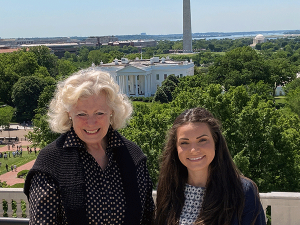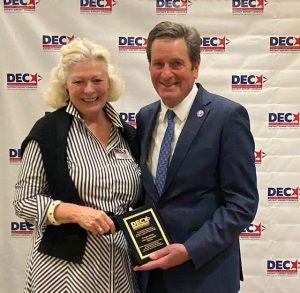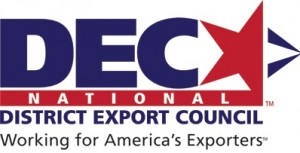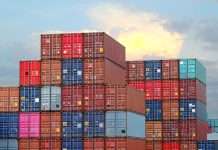
The California Chamber of Commerce recently joined nearly 150 trade specialists from across the nation for sessions focused on trade issues at the National Association of District Export Councils (NADEC) annual two-day event in Washington, D.C.
The NADEC is made up of the 60 regional district export councils. The more than 1,500 DEC members around the country all are appointed by the Secretary of the U.S. Department of Commerce. The mission of the DECs is to work with the Commerce Department on export promotion and commercial diplomacy.
Susanne T. Stirling, CalChamber vice president of international affairs, and Nikki Ellis, CalChamber international affairs specialist, were among participants at the May 19–20 events. Stirling serves on the Northern California DEC and is an associate member of the NADEC.
Attending the conference from California were members of the NorCal DEC, the SoCAL DEC, the San Diego and Imperial DEC, and the Inland Empire DEC.
National Association of District Export Councils Annual Export Conference
Day 1

Shawn Levsen, NADEC chair and international sales manager for UPS, opened the May 19 summit with a welcome to the group gathered in Washington, D.C. for the two-day event. Luke Lindberg of the South Dakota DEC and executive director of global strategy, innovation at the World Clinic at Sanford Health then presented an award to Congressmen John Garamendi (CA-3) and Dusty Johnson (South Dakota), who were present. The award recognized the congressmen for their efforts to pass the Ocean Shipping Reform Act in the U.S. House of Representatives.
Port Crisis
The welcome was immediately followed by breakout sessions with the option to attend one of two sessions. The first session was a trade policy update with the subject “Port Crisis in America: Causes, Affects, Solutions.” This discussion was moderated by John Saylor of the Virginia/DC District Export Council (DEC) and Director of International Trade at the Group at Commonwealth Trading Partners, Inc. Speakers included Christopher Connor, CEO of the American Association of Port Authorities; Jay Schuler, founder of Richland IFC and chair of the North Dakota DEC; Yevgeniy Epshteyn, president of Nova Shipping and member of the East Michigan DEC.
The group discussed the importance of the nation’s ports as geopolitical strategic assets, as the ports create $5.4 trillion in revenue annually amounting to 26% of the nation’s GDP. However, it was noted that 50% of containers on ships are currently empty, which is contributing to the backlogs causing the supply chain crisis. The Federal Maritime Commission, tasked with setting regulations for the nation’s ports, has only a $30 million annual budget to police a multitrillion-dollar-a-year industry. One speaker equated it to a small-town police force policing New York City.
Solutions that could help ease the port congestion were discussed, beginning with data sharing throughout the whole supply chain. When cargo gets handed off from one stakeholder to the next, the data for that cargo often falls into a “black hole.” Another suggestion was to expedite the hiring process; there are not multiple months available to re-hire employees when goods need to be moved immediately. Also discussed was that China builds and owns many of the world’s containers; the U.S. needs to build its own containers as a matter of national security.
Exporting in Web 3.0
The second session focused on “Exporting in Web 3.0: Navigate eCommerce, Metaverse, NFT’s, Cryptocurrency, Blockchain & Virtual Reality.” The speakers for this discussion were Naomi Jordan Cook, cofounder of VGC Group; Courtney Sanders, founder of CourtneySanders.com; and Mack Hendricks, CEO of FlyBall. The discussion was moderated by W.E. DaCruz, cofounder of the VGC Group, from the Michigan DEC.
South American Trade Opportunities
The second round of morning breakout sessions featured a personal favorite topic, South American trade opportunities. The session moderated by Alex Sanchez, president and CEO of the Florida Bankers Association, featured speakers Ambassador Alfonzo Quinonez, Ambassador of Guatemala to the U.S.; Max Trujillo, president of MJT Policy; and Mariano Parlato, country manager for DISS and member of the Puerto Rico DEC.
The panel discussed the effects of COVID on the Latin American region which caused a 7% average loss in GDP. Ambassador Quinonez pointed out, however, that Guatemala lost the least from the COVID pandemic and actually grew at a pace of 7.5% in 2021. The U.S. is the largest trading partner for many countries in Latin America, and for Guatemala about 30% of their trade is with the U.S. The Latin American region is a perfect fit for near shoring products. One speaker quipped that a better name for it would be “friend or ally shoring,” as there is no better business partner than our allies within our hemisphere.
Travel, Tourism, Education
The concurrent breakout session highlighted exporting in travel, tourism, and education. Fred Latuperissa from the California Inland Empire DEC and president of the ExIm 20/20 Group LLC moderated the session. Speakers included Koka Lakshsman, vice chairman of the EDC Soboba Ban of Luiseno Indians; Nate Welch, president of the Vermillion Chamber in South Dakota; and Sandy Renner from the Minnesota DEC, chair of FasTrack Global Expansion Solutions, Inc.
Keynote: Ex-Im Bank
The lunchtime keynote address featured a conversation between the new chair of the Export-Import Bank, The Honorable Reta Jo Lewis, and NADEC Trade Policy Chair David Day on the bank’s new policies, broader mission and enhanced focus on small business.
Lewis outlined some of the Ex-Im Bank’s programs for exporters, including the China and Transformational Exports Program (CTEP) which gives the bank special authority to make financing available in sectors where America needs to use innovation and technological might to stay ahead of the game. She specifically mentioning sectors such as renewables, energy storage, quantum computing, artificial intelligence (AI), and semiconductors. Lewis noted that the most important part is making sure that when people want to work with a U.S. company that there will be flexibility in making that happen.
Lewis also spoke about the Build Back Better and Make More in America initiatives that encourage like-minded countries coming together to support large global infrastructure projects. She specifically mentioned working with diaspora communities to develop more commercial ties for America in immigrants’ home countries, as they often have strong ties to their native lands and such connection could be highly beneficial for American small and medium enterprises (SMEs). Lewis’ most important tip for those looking to work with the Ex-Im Bank was simply to just put in an application and ask. She joked that the Ex-Im Bank can’t help you if you don’t ask. Lewis also noted that the Ex-Im Bank hosted more than 600 webinars during COVID and hopes that the bank can modernize their producers to be a better resource for helping American businesses to grow.
United Kingdom
The afternoon breakout sessions offered country-specific topics. The first session titled “U.K. Open for Business: The Way Forward” was moderated by Urszula Wojciechowska of the Massachusetts DEC and executive director of the Coalition of New England Companies for Trade. The speakers included Sarah Clegg, head of trade policy for the British Embassy in DC; Tim Crouch, director of Investment in North America for the U.K. Department of International Trade, and Emanuel Adam, chief policy and trade officer for BritishAmerican Business.
The group discussed recent and upcoming negotiations between the U.S. and the U.K. including a refreshed Atlantic Charter last year and a planned June 22 meeting in Boston for the fifth U.S.-U.K. SME Dialogue. The British representatives noted that the U.K. is ready whenever the current administration is to pick up on negotiations for a U.S.-U.K. Free Trade Agreement. The representatives also pointed out a unique feature of the U.K. government that allows any subsidiary located in the U.K. to take advantage of their country’s resources to help them export.
There was also a discussion of the U.K.’s future goals as the country continues after Brexit. The U.K. has pledged to reach net zero emissions by 2050 and hopes to “level up” their population by ensuring the spoils of growth are shared across England geographically and with nontraditional groups. The U.K. is positioned to emerge as a science and technology super power in the world.
Exporting to India
The second session offered attendees the opportunity to learn about exporting to India. Moderated by David Day, the session featured speakers Stacey Standley of the Nevada DEC and former managing director of Sikland-Standley Ent. Pvt. Ltd., and Samir Kapadia, chief operating officer and principal at the Vogel Group.
Resources for Increasing Exports
The second round of afternoon sessions gave the option between a small and medium enterprise resources for increasing exports touting an “education institutional advantage” and a U.S.-Africa trade relations briefing on “how to be part of the economic growth and development on the ‘new frontier.’” The first option, moderated by Mark Ballam of the San Diego & Imperial DEC and managing director at San Diego State University Center for Advancing Global Business, covered two topics. The first topic, “understanding the digital trade revolution, new tools for U.S. small businesses,” was led by Simona Racek of the San Diego & Imperial DEC from Getting to Global. The second topic, “utilizing the educational institutional advantage,” provided insight from Jonathan Szucs of Advanced Superabrasives, Inc. and Tom Robinson of the North Carolina DEC and X-Culture.
The first speaker discussed an online workspace that allows paperwork to be done digitally, moving the medium of transactions online. She touted the “EDDT workplace” platform, saying it allows trust to build between a buyer and seller.
The remaining speakers discussed the importance of using student interns and helping to cultivate interest in international trade amongst the next generation. One such program that teaches international business skills to college students and now high schoolers called X-Culture, was showcased. This program, used by a handful of universities across the world, allows students to be challenged and develop the “hard skills” needed to succeed in an international business environment.
U.S.-Africa Trade Relations
The other breakout session on U.S.-Africa trade relations was moderated by W.E. DaCruz of the Michigan DEC and cofounder of the VGC Group. The session featured Africa experts Deniece Laurant-Mantey, the National Security Council director for Africa; Akindele Akinyemi, president and CEO of the Global African Business Association; and Michael Sudarkas, CEO of Africa Business Group.
Southbound Trade Initiative
The final breakout sessions of the day gave another two options to choose between. The first session showcased the southbound trade initiative with Ernesto Pinal from the Idaho DEC and managing director of Export Optimizers. Speakers included John Leighton, economic minister at the Canadian Embassy in the U.S., and Cesar Rames, head of the Office for the Administration of the USMCA at the Mexican Embassy in the U.S.
The Americas are home to 13% of the world’s population, generate 34% of world GDP and have 40% of the world’s reserves of strategic minerals. Minister Leighton noted that Canada is one of a few countries in the world that has all the minerals required to make batteries, but those minerals are in remote areas and require an investment in infrastructure to gain access. Canada has incentivized such investment by doubling its mineral extraction tax credit and investing in research and development to develop better ways to extract these minerals. Canada’s expertise in mining is important knowledge for the rest of Latin America, which has a robust mining sector. The development of such strategic partnerships is essential to counter China’s One Belt One Road initiative as China tries to invest in the hemisphere.
Mexico also provides a competitive environment for businesses as it offers a developed road and railway infrastructure system. Every minute, $1.2 million in trade with Mexico takes place. Mexico also is currently building a rail and highway system across its southern region to act as an alternative to the Panama Canal. It was suggested to leverage the existing free trade agreements in the region to use value added and content accumulation for products as they travel throughout the supply chain and become a finished product.
How to Finance Export Business
The alternative session covered how to finance your export business and was moderated by Luke Lindberg of the South Dakota DEC, executive director of Global Strategy, Innovation at the World Clinic at Sanford Health. The three speakers were: Scott Stevenson, senior vice president of trade at the Bankers Association for Finance and Trade; Daniel Pische, national director of trade and finance for the U.S. Small Business Administration; and Aerek Stephens, head of the regional export promotion program at the Export-Import Bank of the U.S.
The long day of workshops concluded with an evening reception where all attendees were excited to meet and greet one another after the two-year pause in the conference due to COVID.
Day 2
Awards
The following day, Shawn Levsen once again gave a morning welcome to the group of trade specialists before presenting the DEC of the Year and Executive Secretary of the Year awards. The Louisiana DEC took home the distinction and Executive Secretary Heather Rank of the North Dakota DEC was acknowledged for her efforts.
International Trade Administration
The group heard from Marie Saldano, undersecretary at the International Trade Administration (ITA). Saldano discussed how economic security depends on competitiveness, which requires ensuring fair and open markets, expanding export opportunities, and increasing investments.
The ITA’s goal is to help ensure resilience, dependability and security in America’s supply chains. Saldano discussed the equity lens the administration is using to form upcoming national export strategies and global diversity export initiatives. The ITA also is developing a clean tech export competitiveness strategy and has an advanced manufacturing trade mission to the Indo-Pacific this fall.
Saldano discussed the administration’s Indo-Pacific Economic Framework (IPEF). The framework has the goals: to share relations, advance economic priorities and competitiveness, ensure trusted data flows, continue tech leadership, develop resilient and secure supply chains, create environmental sustainability, and encourage good governance and tax policy.
Saldano also discussed the U.S.-EU Trade and Technology Council (TTC), which is focused on mutual competitiveness and prosperity grounded in a shared market and democratic values. The second ministerial for the TTC was held at the beginning of May. Saldano also discussed future meetings of the Quad Leaders (which are being held this week) where they hope to collaborate on climate, infrastructure, and critical and emerging technologies. Saldano did not forget to mention the U.S.-Japan Commercial and Industrial Partnership, which is focused on creating new opportunities for U.S. businesses and their workers and holding countries who seek unfair advantages accountable.
Exporting to Island Nations
The presentations were followed by the day’s first round of breakout sessions. The first option provided some island vibes with the topic of exporting to island nations. Moderated by Elizabeth Chan, CEO of the Global Risk Mitigation Foundation, the session featured an array of speakers. Speakers included: Luke Lindberg of the South Dakota DEC and executive director of global strategy, innovation at the World Clinic at Sanford Health; Joseph J. Cella, immediate past Ambassador to Fiji ; Phillip Mendiola-Long of the Hawaii Pacific Export Council; and Ambassador John Hennesey-Niland, U.S. Ambassador to the Republic of Palau.
Cybersecurity Impact on Trade
The alternative session featured a very interesting and timely subject, cybersecurity and the global impact on trade. Scott Blacklin of the Virginia-DC DEC, principal and CEO of Blacklin Associations, LLC moderated the session. Speakers were cybersecurity experts, including Dr. Oz Erdem, past NADEC Chair with Linqs Inc.; Donald McCarthy, director of field operations for Open Source Context; Shalon Simmons, president of Secure Global Solutions LLC; and Aaron Amundson, director of the Information Technology Control Division at the Bureau of Industry and Security.
The panel discussed the amount of regulatory mismatches that occur with countries, states and companies trying to regulate the digital environment. Billions of dollars get transferred through fake transfer scams every year and with the internet, the threat can reach anyone anywhere at anytime. A group of 41 countries have decided to set digital export control standards.
The variety of cybersecurity products that can offer protection includes products that encrypt functionality; items whose primary function is to intercept live conversation without participants knowing; mobile telecommunications interception; and cyber tools such as penetration testing products. One speaker noted that the formal name of cyber security is actually information assurance. Your data and your assets are intertwined and everyone should have a contingency plan on how you would respond and recover from a cyber security disaster. One speaker said that physical security of the data also is important, telling an anecdote of how easy it is to get into secured areas when dressed like a worker carrying a ladder. The speakers all agreed that it is not a matter of if, but of when a company will experience a cyber security breach.
Former Deputy Secretary
The final day’s lunch featured keynote speaker Karen Dunn Kelley, former deputy secretary of the U.S. Department of Commerce. Dunn Kelley spoke of the prosperity that every American experienced during the height of the former administration as the nation experienced its strongest economy in history and record low employment before the pandemic hit. She reiterated the importance of economic security to national security, equating economic strength to the art of innovation, growth, and progress as a nation. Dunn Kelley also noted that the U.S. not only exports our goods and services to the world, but also our unique value proposition.
Dunn Kelley spoke of how economic and national security is both the foundation and the result of good policies. Fair, free, and reciprocal trade is essential for mutually beneficial commerce to lift developing nations out of poverty through trade instead of aid. Placing regulations on the U.S. economy creates a hidden tax that disproportionately affects small businesses. She eloquently said that when Americans have the opportunity to compete, we thrive.
Dunn Kelley spoke of the Trump administration’s success renegotiating the U.S.-Mexico-Canada Agreement, noting that by 2026 the U.S. GDP is expected to increase by $70 billion as a result of the updated agreement. She also pointed out that the former administration was the first to use Section 301 to combat China’s unfair trade practices. China’s intellectual property theft costs the U.S. about $600 billion a year. She noted that the trade deficit with China has increased by 60% since 2019.
Supply Chain Opportunities
The afternoon’s first breakout sessions gave the option between supply chain opportunities to increase your exports and DEC engagement and orientation. The supply chain session was moderated by NADEC Chair Shawn Levsen and featured speakers Jess Dankert, vice president of supply chain with the Retail Industry Leaders Association; Kristopher Denzel, director of government affairs for DHL Express; and Gerd Uitdewilligen, director of international sales for Emerson Cargo Solutions.
The panel discussed the importance of having diversified, agile supply chains and back-up suppliers, along with the need to have a “buffer approach.” The panelists’ consensus was that there is not a lot of optimism yet that the state of the supply chains will improve in the near future, especially with the start of port labor negotiations this month. It was noted, however, that shippers have been dealing with the backlogs for two-and-a-half years now, so they have developed a sense of what they need to do to be able to plan for and mitigate any issues that might arise.
Mentioned specifically during the discussion was how California agricultural exporters are struggling to find empty containers for products that have a shelf life. Every step of the supply chain needs to come together to create a bigger voice to help solve the problems everyone is experiencing. One suggestion was to diversify U.S. warehouses to buffer supply chain disruptions , although doing so may not be easy for smaller exporters.
Important advice from Levsen was to involve your carrier in the design of your supply chain. Build a relationship with your carrier, work with them and have them make recommendations, as it is harder for the carrier to help a company solve problems when they are unfamiliar with the product and supply lines. Other advice from the panel included looking closer at suppliers, keeping your eyes out, not putting all your eggs in one basket, and just keep adjusting when needed.
DEC Engagement
The concurrent session on DEC engagement was moderated by Anne Burkett of the Alabama DEC, executive director of the North Alabama International Trade Association (NAITA). Speakers for this session included Brenda Stelly from the Louisiana DEC, president of Oil Center Research International LLC; Sandy Renner of the Minnesota DEC, chair of FasTrack Global Expansion Solutions Inc.; and Tee Persad, from the Central-North Florida DEC, an attorney, mediator and business consultant.
Challenging Export Markets, Updates, Underserved Communities
The last breakout sessions of the conference looked internationally. The first session covered exporting to challenging markets, specifically the Middle East. This session was moderated by Sheriah Johnson of the Georgia DEC, trade compliance manager with NCR Corporation. Speakers included Nate LaMar, associate director of regional initiatives at Ball University, and Kelly Watkins with the Kentucky DEC, president of Expressive Concepts. The alternative session saw Scott Blacklin give a trade policy and global markets update covering the U.S. Department of Commerce in 2022 and beyond.
The conference was rounded out by a final singular workshop given by Fred Latuperissa on using the DEC to reach underserved communities.
The conference ended with an overview of small business success stories thanks to their local DECs. In closing remarks, Levsen thanked everyone for attending the first export conference post-COVID.
The National Association of District Export Councils meetings next year will be held again in Washington, D.C. with dates to be determined.

